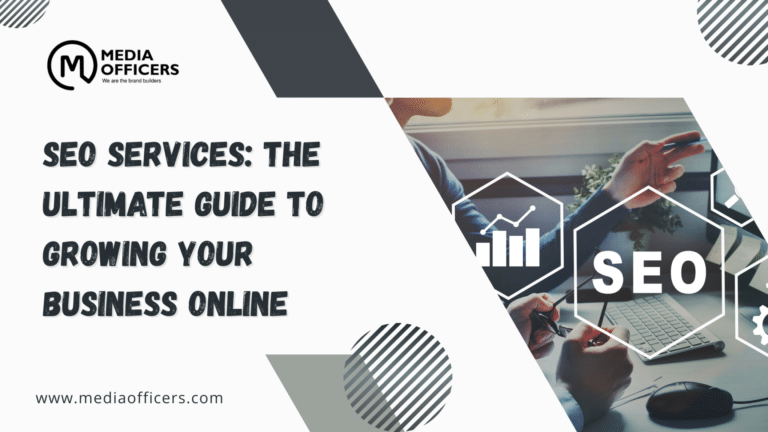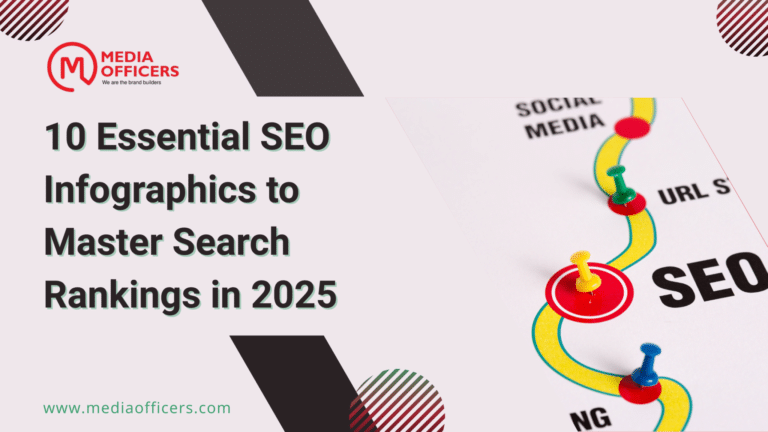SEO with AI and Machine Learning: Search Engine Optimization (SEO) is the practice of enhancing website visibility and traffic through organic search engine results. It is a vital component of digital marketing, helping businesses improve their online presence and reach target audiences. Artificial Intelligence (AI) involves the simulation of human intelligence processes by machines, particularly computer systems.
AI has been increasingly adopted across various industries, including digital marketing, to enhance efficiency and streamline processes. The integration of AI in SEO has transformed digital marketing strategies. AI-powered tools and algorithms provide marketers with deeper insights into consumer behavior, automate repetitive tasks, and deliver personalized user experiences.
Businesses can now utilize AI to optimize websites for search engines, enhance user experience, and create more targeted content. This article will examine the impact of machine learning on search algorithms, the growth of voice search and natural language processing, personalization and user experience in SEO, AI’s role in content creation and optimization, and the future of SEO with predictive analytics and automation. Additionally, we will explore how businesses can adapt to the evolving SEO landscape influenced by AI and machine learning.
Key Takeaways
- SEO is the practice of optimizing websites to rank higher in search engine results, and AI is playing an increasingly important role in this process.
- Machine learning has significantly impacted search algorithms, allowing search engines to better understand user intent and deliver more relevant results.
- Voice search and natural language processing are on the rise, requiring SEO strategies to adapt to conversational queries and long-tail keywords.
- Personalization and user experience are crucial in SEO, and AI helps in analyzing user behavior to deliver personalized content and improve overall user experience.
- AI is revolutionizing content creation and optimization by helping to generate and optimize content for better search engine visibility and user engagement.
The Impact of Machine Learning on Search Algorithms
From Keyword Matching to Intent-Based Search
Traditional search algorithms relied on predefined rules and keyword matching to rank web pages. However, with the introduction of machine learning, search engines can now analyze a wide range of factors, such as user behavior, context, and content quality, to provide more accurate search results.
A Shift to Holistic Optimization
Machine learning algorithms can understand the intent behind a user’s search query and deliver results that best match that intent. This has led to a shift from keyword-based optimization to a more holistic approach that focuses on providing valuable and relevant content to users. Additionally, machine learning has enabled search engines to better understand natural language and semantic search, allowing them to interpret the meaning behind words and phrases more accurately.
Personalized and User-Centric Search Engine Rankings
Furthermore, machine learning has also improved the way search engines rank web pages by considering various factors such as user engagement, click-through rates, and bounce rates. This has led to a more personalized and user-centric approach to search engine rankings, where websites that provide high-quality content and a positive user experience are rewarded with higher rankings. Overall, machine learning has transformed search algorithms by making them more intelligent, adaptive, and user-focused.
The Rise of Voice Search and Natural Language Processing

The rise of voice search and natural language processing has been one of the most significant developments in SEO in recent years. With the increasing popularity of voice-activated devices such as smart speakers and virtual assistants, more users are now using voice search to find information online. This shift has prompted businesses to optimize their websites for voice search by focusing on conversational keywords and long-tail phrases that reflect how people speak.
Natural language processing (NLP) has played a crucial role in enabling search engines to understand and process voice queries more effectively. NLP algorithms can analyze the context and intent behind a user’s voice search query, allowing search engines to deliver more accurate and relevant results. This has led to a greater emphasis on providing conversational and contextually relevant content that aligns with how people naturally speak.
Moreover, the rise of voice search has also impacted local SEO, as users often use voice search to find nearby businesses or services. As a result, businesses need to optimize their online presence for local voice search by ensuring their business information is accurate and up-to-date across various online platforms. In conclusion, the rise of voice search and natural language processing has reshaped the way businesses approach SEO by emphasizing conversational content and local optimization.
As voice search continues to grow in popularity, businesses will need to adapt their SEO strategies to accommodate this shift in user behavior.
Personalization and User Experience in SEO
Personalization and user experience have become integral components of SEO, thanks to advancements in AI and machine learning. With the ability to analyze vast amounts of data, AI-powered tools can now personalize content and experiences for users based on their preferences, behavior, and demographics. This level of personalization not only improves user engagement but also enhances the overall user experience on a website.
AI has enabled businesses to deliver personalized recommendations, product suggestions, and content tailored to individual users’ interests. By analyzing user data and behavior patterns, AI can identify relevant content that resonates with each user, leading to higher engagement and conversion rates. This level of personalization not only improves user satisfaction but also increases the likelihood of users returning to the website.
Furthermore, AI has also played a crucial role in improving website usability and accessibility. For example, AI-powered chatbots can provide instant support and assistance to users, enhancing their overall experience on a website. Additionally, AI can analyze user behavior to identify pain points and areas for improvement, allowing businesses to optimize their websites for a more seamless user experience.
In summary, personalization and user experience have become key differentiators in SEO, thanks to AI and machine learning. Businesses that prioritize personalization and user-centric experiences are likely to see higher engagement, retention, and conversion rates.
The Role of AI in Content Creation and Optimization
AI has revolutionized content creation and optimization by enabling businesses to produce high-quality, relevant content at scale. AI-powered tools can analyze vast amounts of data to identify trending topics, keywords, and consumer insights that inform content creation strategies. This level of data-driven intelligence allows businesses to create content that resonates with their target audience and aligns with search engine algorithms.
Moreover, AI has also improved content optimization by providing actionable insights into keyword usage, readability, and relevance. AI-powered tools can analyze content performance metrics and provide recommendations for optimizing content for search engines. This level of automation not only streamlines the content optimization process but also ensures that content meets the evolving requirements of search engine algorithms.
Additionally, AI has enabled businesses to leverage natural language generation (NLG) technology to create personalized content experiences for users. NLG algorithms can generate dynamic content such as product descriptions, personalized recommendations, and email campaigns that resonate with individual users. This level of personalization not only enhances user engagement but also improves the overall effectiveness of content marketing strategies.
In conclusion, AI has become an indispensable tool for content creation and optimization in SEO. Businesses that leverage AI-powered tools for content creation are able to produce high-quality, relevant content at scale while optimizing it for search engines and delivering personalized experiences to users.
The Future of SEO: Predictive Analytics and Automation

Predictive Insights for Proactive SEO Strategies
Predictive analytics leverages machine learning algorithms to forecast future trends, consumer behavior patterns, and search engine algorithm updates. By analyzing historical data and identifying patterns, businesses can gain valuable insights into upcoming trends and proactively adjust their SEO strategies to stay ahead of the curve.
Streamlining SEO Tasks with AI-Powered Automation
Furthermore, automation powered by AI will continue to streamline repetitive tasks such as keyword research, content optimization, and performance tracking. AI-powered automation tools can analyze vast amounts of data in real-time to make data-driven decisions that optimize websites for search engines. This level of automation not only improves efficiency but also allows businesses to focus on higher-level strategic initiatives that drive long-term growth.
Delivering Hyper-Personalized Experiences with AI
Moreover, AI will play a crucial role in enabling businesses to deliver hyper-personalized experiences through predictive analytics. By analyzing user behavior and preferences, businesses can anticipate individual needs and deliver tailored content recommendations that resonate with each user. This level of personalization not only enhances user engagement but also increases the likelihood of conversion.
In summary, the future of SEO will be characterized by predictive analytics and automation powered by AI. Businesses that embrace these advancements will be able to stay ahead of the competition by proactively adapting their SEO strategies based on predictive insights while delivering hyper-personalized experiences that drive user engagement and conversion.
Adapting to the Changing Landscape of SEO with AI and Machine Learning
As AI and machine learning continue to reshape the landscape of SEO, businesses must adapt their strategies to leverage these advancements effectively. One key aspect of adapting to the changing landscape of SEO is investing in AI-powered tools that streamline processes such as keyword research, content optimization, and performance tracking. By leveraging these tools, businesses can improve efficiency while gaining deeper insights into consumer behavior and search engine algorithms.
Furthermore, businesses must prioritize user-centric experiences by leveraging AI for personalization and user experience optimization. By analyzing user data and behavior patterns, businesses can deliver tailored content recommendations, personalized product suggestions, and seamless website experiences that resonate with individual users. This level of personalization not only improves user engagement but also increases the likelihood of conversion.
Moreover, businesses must stay informed about the latest advancements in AI and machine learning that impact SEO. By staying ahead of industry trends and proactively adapting their strategies based on predictive insights, businesses can position themselves for long-term success in an ever-evolving digital landscape. In conclusion, adapting to the changing landscape of SEO with AI and machine learning requires businesses to invest in AI-powered tools, prioritize user-centric experiences through personalization, and stay informed about industry trends.
By embracing these advancements, businesses can stay ahead of the competition while delivering high-quality content experiences that resonate with their target audience.
If you’re interested in learning more about how AI and machine learning are impacting SEO, you may also want to check out this article on SEO services for florists. It provides insights into how businesses in specific industries, like floristry, can benefit from utilizing AI and machine learning in their SEO strategies.
FAQs
What is SEO?
SEO stands for Search Engine Optimization, which is the practice of increasing the quantity and quality of traffic to your website through organic search engine results.
What is AI and Machine Learning?
AI, or Artificial Intelligence, refers to the simulation of human intelligence in machines that are programmed to think and learn like humans. Machine Learning is a subset of AI that allows machines to learn from data and improve their performance over time without being explicitly programmed.
How is AI and Machine Learning impacting SEO?
AI and Machine Learning are impacting SEO by helping search engines better understand and interpret user queries, improve search results, and provide more relevant and personalized content to users.
What are some examples of AI and Machine Learning in SEO?
Examples of AI and Machine Learning in SEO include Google’s RankBrain algorithm, which uses machine learning to help process search results, and natural language processing tools that help search engines understand and interpret user queries more accurately.
How can businesses adapt to the evolving landscape of SEO with AI and Machine Learning?
Businesses can adapt to the evolving landscape of SEO with AI and Machine Learning by focusing on creating high-quality, relevant content, optimizing for voice search, and utilizing AI-powered tools to analyze and improve their SEO strategies.






